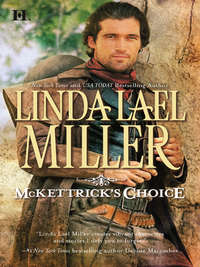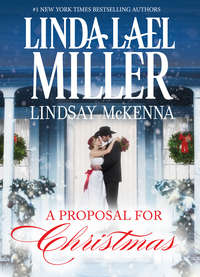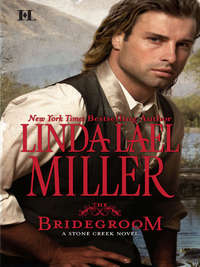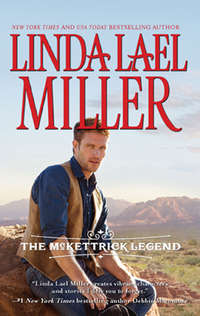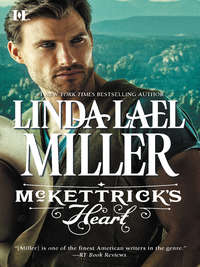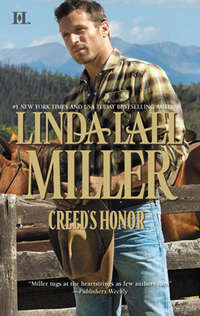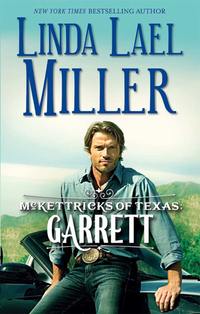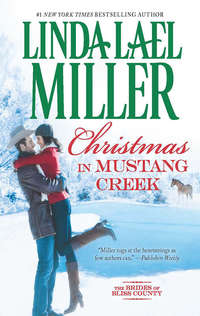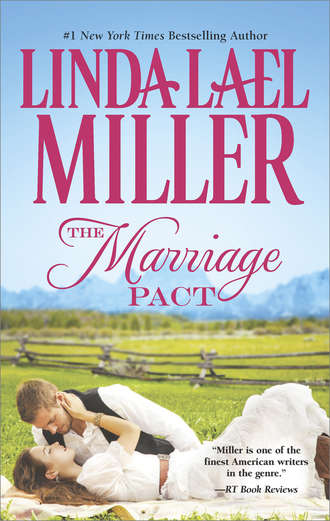
Полная версия
The Marriage Pact
Tripp couldn’t sustain the fake grin any longer; it had already hardened into a grimace, so he let it fall away, like a handful of pebbles clattering down the face of a cliff. “What’s the story, Dad?” he demanded quietly. “And don’t give me any of that John Wayne, man-of-few-words bullshit, either. Tell me what’s wrong.”
Jim sighed and pushed away from the pole to stand up straight. He swayed almost imperceptibly, and his hold on Tripp’s shoulder briefly tightened.
“I reckon you have a right to know,” he allowed after a long time spent pondering. He gestured toward the gaping front door. “But we’re letting the flies in, standing out here like this, and, besides, I’d just as soon have this conversation inside the house, with a cup of hot coffee in front of me—if it’s all the same to you.”
Tripp nodded tersely, willing to accept that much of a delay and no more, and wisely but barely refrained from taking hold of Jim’s arm and ushering him over the threshold.
Pausing just inside, he whistled for Ridley, who ignored him completely, busy checking out one of the flower beds now.
“Let the poor critter be,” Jim said in a kindly rasp. “He needs to breathe some fresh air and stretch his legs a bit.”
Tripp hesitated, walking close behind his stepfather, ready to catch him if he stumbled. “But he could run off or something...”
Jim, shuffling across the worn plank floors of the living room now, didn’t look back. “He’ll be fine,” he replied. He gave another scratchy chuckle. “This isn’t the big city, son. If he runs off, he’ll come back. Anyhow, there’s not much traffic on the county road, let alone way out here, so it’s not as if he’s fixing to get himself run over by a garbage truck or one of those taxicabs.”
In spite of what he’d guessed, and the dread of all he still didn’t know, Tripp laughed, a short, hoarse bark of a sound. “No, sir,” he countered. “This country’s as safe as a Sunday-school picnic—if you don’t mind a few wolves, coyotes, rattlesnakes and grizzly bears.”
Jim shook his head, passing through the archway and into the dining room. “Been too long since you set foot on plain ol’ dirt,” he observed drily. “Living in Seattle all those years, surrounded by nothing but concrete and asphalt, why, it’s done something to your brain. Made a worrywart out of you.”
Tripp smiled—this time for real. To Jim’s way of thinking, any community with a population over ten thousand was too big for its own good.
Therefore, he didn’t bother to make a case for Seattle. Jim would only sigh and shake his head again. What Tripp did say was, “The point is, I’m back to stay.”
Jim paused in the open doorway to the kitchen, gripped the framework with one hand to steady himself, take a moment’s rest. “It’s about damn time, too,” he grumbled good-naturedly, squaring his bony shoulders and then, with a little too much effort, moving forward again.
Tripp was relieved when his stepfather finally made it to the kitchen, crossed to the table and pulled out a chair to sit down.
“I’ll get you that coffee,” Tripp said lightly. “In the meantime, start talking.”
Chapter Three
JIM TOOK A while to catch his breath. He was pale under that perennial outdoorsman’s suntan of his, and he closed his eyes for a second, summoning strength. When he opened them again, he looked at Tripp with a kind of weary directness.
“I’ve been sick,” he finally confided. “That’s the long and the short of it.”
Tripp, in the process of filling the carafe from the coffeemaker at the sink, froze; his throat went tight as a cinch strap that’d been yanked hard around a horse’s belly and buckled to the last notch. “What kind of ‘sick’?” he asked when he was halfway certain he could speak without stumbling over every word.
His biological father, who’d died after a routine appendectomy when Tripp was still a newborn, was an unknown quantity, a story his mother told, an unfamiliar image in old snapshots.
Jim Galloway was his dad.
Jim sighed once more. “Not the dyin’ kind, so don’t go writing up my obituary and looking for places to scatter the ashes,” he said in his slow and thoughtful way. “I’ll be around awhile, most likely.”
Tripp’s jawbones locked at the hinges. “Most likely? What the hell is that supposed to mean?”
Jim, watching Tripp with a mixture of compassion and amusement in his eyes, dredged up a raw chuckle that sounded like it must have hurt some on its way out.
“Everybody has to die sometime, son,” he said hoarsely. “No sense getting all knotted up over something that can’t be helped.”
Tripp leaned back against the counter while he waited for the coffee to brew, folding his arms. He probably appeared calm, but he sure as hell wasn’t. “How long has this been going on?”
His voice, like his manner, was deceptively mild.
Jim likely wasn’t fooled, but it was hard to tell with him. He tended to play his cards close to the vest—everybody’s business was nobody’s business; that was his credo. In other words, he operated on a need-to-know basis, and there was plenty he didn’t think anyone needed to know.
After a beat or two, he smiled again, but he still took his time answering. “I’ve known for just shy of a year,” he finally admitted and, sparse as the reply was, it was plain to Tripp that his dad didn’t like giving up even that much.
Stunned that Jim—even Jim—could have kept something so important to himself for so long, Tripp had opened his mouth to raise more hell when the old man cut him off with a dismissive wave of one hand.
“Some things are—well, private,” he said.
Behind Tripp, the ancient coffeemaker, pulling its weight since pre-Y2K days, chortled and thumped and steamed on the counter, like a small volcano about to blow.
“Private?” Tripp repeated, disbelieving.
Jim kept his gaze averted. A ruddy flush climbed his neck. “I’ll be all right,” he insisted, so quietly Tripp had to strain to hear him. “And I’d sure appreciate it if you’d stop repeating practically everything I say.”
Tripp shoved away from the counter and the noisy coffee machine, scraped back a chair across the table from Jim and sank onto the hard wooden seat. “Well, now,” he replied tersely and with a fair amount of irony. “Whatever disease it was that damn near killed you, and probably still could, is private. Why didn’t you just say so in the first place?”
Jim met Tripp’s eyes with stubborn reluctance. “I could do with a mite less attitude, if it’s all the same to you,” he grumbled in response. A muscle worked in one side of his jaw, as though he was chewing on a chunk of rawhide, then he went on. “The worst is over, son. I’ve done everything the doctors said I ought to, and I’m on the mend now. I just seem to tucker out a little sooner than I used to, that’s all.”
Tripp stared at his dad, imagining some of the things the man might have endured alone, depending entirely on his own stoicism, his damnable pride. In those moments, Tripp didn’t know if he wanted to put a fist through the nearest wall or bust out bawling like a little kid.
In the end, he did neither; he simply waited for the rest of the story.
Meanwhile, Jim’s neck went from red to a purplish-crimson. “Turned out to be my prostate that was causing all the trouble,” he finally said. The words might have been dragged out of him the way he held on to each one of them like a grudge that went back for generations.
Tripp took a few moments to absorb the hard-won answer, exhausted by the effort of getting it. “I’ll be damned,” he ground out, once the information had begun to penetrate, “if it wouldn’t have been easier to drive half a dozen mules out of a knee-deep mudhole than get an answer out of you.”
With that, his vocal chords seized up again, and the breath rushed out of him, as though he’d been thrown from a horse, landed on hard-packed dirt and gotten his throat stepped on in the bargain.
On the one hand, he knew his dad hadn’t gotten sick on purpose. On the other, he felt ambushed, cornered, kept in the dark. Combined, those emotions stung through his blood like venom.
Tripp had been in this place twice before—the first time when his mother had died suddenly, and then again, strangely chilled even in the stifling heat of a foreign field-hospital, watching helplessly while the closest friend he’d ever had, or ever expected to have, breathed his last.
For once, it was Jim who got the conversation going again.
“Coffee’s ready,” he said amiably. From his tone, a person would have thought they’d been talking about something ordinary, like that year’s hay crop or local politics.
“Screw the coffee,” Tripp replied, jolted all over again. He sucked in a breath and leaned forward in his chair. “What the hell, Dad?” he demanded in a raspy whisper. “All of a sudden, you’re as delicate as somebody’s spinster aunt, so hung up on modesty—or whatever—that you’re embarrassed to mention your prostate?”
Jim said nothing, the bullheaded old coot.
Equally stubborn, Tripp pressed the issue. “It’s not as if I didn’t know you had one. And guess what? So do I.”
Since the remark was rhetorical, and since he was Jim, Tripp’s dad didn’t comment right away, although he still looked sadly exasperated. He shoved a hand through his shock of gray-white hair and, at last, made an effort to explain.
“I didn’t figure on it taking so long to get my strength back, that’s all,” he confessed. “I wouldn’t have said a word about it, being sick, I mean, if I could have managed the ranch on my own.” A sheen of moisture glistened in his eyes, and his Adam’s apple bobbed as he swallowed hard. “As it turned out, I couldn’t. Too many things were slipping around here, too fast.” Jim paused again, colored again, this time in shades of defiance. “Just the same, I knew damn well I wasn’t going to die, knew it from the first. I won’t say there weren’t some tough days, and some hard nights, too, because there were, but I’ve been through worse—a lot worse.” He stopped once more, regrouping. “Like losing your mother. Ellie was my North Star. You know that.”
Tripp felt a familiar stab of sorrow, because Ellie Galloway, his mom, had been true north on his inner compass, too. Even after all this time, there were still moments when he couldn’t believe she was gone.
He didn’t trust himself to speak, so he just scowled. Jim wasn’t off the hook, and Tripp wanted him to know it.
Jim made an impatient sound low in his throat. “What was I supposed to do, Tripp? Tell me that. Should I have asked you to come home the minute all of this started, so we could both be miserable?”
Not in the least mollified, even though he knew he would probably have done pretty much the same thing in Jim’s place, Tripp didn’t answer. He stalked over to the coffee machine, sloshed some java into a chipped mug and then set the stuff in front of his dad with a solid thump of crockery meeting tabletop.
He didn’t return to his chair.
Jim took a sip of coffee, savored it for a moment or two and said, “Thanks.” Another sip followed, and another. Eventually, though, he continued, “I guess I could have spoken up a little sooner.”
Tripp, standing at the long row of windows now, his back to Jim, watched Ridley gamboling around the side yard, evidently chasing a bug. “You think?” he snapped.
The coffee, strong and black the way he liked it, must have rallied Jim considerably, because he sounded almost like his old self when he replied lightly, “Then again, I might have been right to hold my tongue, after all. I figured you’d get your britches in a twist once you knew, no matter when you found out, or how, as far as that goes.”
Shaking his head, Tripp turned from the windows. “You’re the only father I’ve got,” he said, calmer now—or maybe just spent. The day had been a long one, after all. He’d been shaken by the encounter with Hadleigh and now...this. “So, yeah, I’d have freaked out in any case. Then I would have stepped up and done what needed doing on this ranch, so you could concentrate on getting well.”
Jim was looking away, probably because his eyes were misty again, and he considered Tripp’s words in solemn silence before offering a concession—of sorts. “I reckon we’ve both got a point.” He blinked a couple of times, then faced his son. “You had a right to know, and I had a right to keep my own counsel. I guess we’ve just been coming at things from different directions.” A pause. “What do you say we meet someplace in the middle?”
Tripp nodded, gulped once, got out a hoarse “Fair enough.”
“Well, then,” Jim decreed with obvious relief, “that’s settled.” He levered himself to his feet. “Now, if you can see your way clear to feeding the horses, I’ll see what I can do to rustle us up some supper.”
Once more, Tripp nodded. There was no point in pursuing the subject any further, not that night, anyway.
So, grimly silent, he helped himself to Jim’s denim jacket, found hanging in its usual place on one of the pegs beside the back door, shrugged into it, straightened the collar.
They still had issues, father and son, but in time, they’d come to terms, hammer out some kind of mutual understanding.
But time wasn’t a fixed commodity, was it? One minute, a person was there, living and breathing. The next, he or she could be gone for good.
Time. Let there be enough of it.
Resigned, Tripp left the house, crossed the back porch and descended the somewhat rickety steps to the yard. Ridley stopped exploring the flower beds and the base of the picket fence and trotted over to Tripp’s side. They both headed for the barn.
The chores were familiar; Tripp could have done them in his sleep.
With Ridley tagging after him, clearly curious about the huge nickering critters standing in the stalls, Tripp filled the feeders with good grass hay, made sure the outdated aluminum water troughs were topped off and paused to greet each of the six horses with a pat and a kindly word.
Later, as he and the dog returned to the house, Tripp stared up at the night sky and watched as the first stars popped out.
Maybe, he thought, things would turn out all right.
In fact, he meant to see to it that they did.
Jim would recover, Tripp assured himself. With more rest and less worry, he’d be his old ornery self in no time at all.
As for making friends with Hadleigh...well, that would be a challenge, for sure and for certain.
And Tripp Galloway loved a challenge.
* * *
MELODY WAS THE first to arrive at Hadleigh’s place that evening, looking rushed and windblown, even though she wasn’t late. She’d buttoned up her black tailored coat without bothering to free her shoulder-length blond hair from under the collar, the strap of her shoulder bag was across her chest and the supermarket deli tray—cheese and cold cuts—shook slightly as she held it out to her hostess with ungloved hands.
“You’ve heard,” she concluded after studying Hadleigh’s face for a moment.
Hadleigh took the tray from her friend, set it on the nearest counter and nodded glumly, there being no earthly reason to pretend she didn’t know what Melody meant. “Tripp’s back,” she said.
Was he still married? Did he have children?
She hadn’t had the courage to ask.
Melody let out a relieved breath, put her purse aside, unbuttoned her coat and flopped it over the back of a chair before fluffing out her formerly trapped hair with a quick swipe of her splayed fingers and a shake of her head. “And?” she prompted, still peering at Hadleigh’s face.
“And he was here,” Hadleigh said. To her, this wasn’t good news, but she knew Melody would be surprised, and she rather enjoyed springing it on her.
The reaction was immediate. “Here?” Melody’s blue-green eyes sparkled with pleased alarm. “Tripp Galloway was here, in this house? When?”
“Today,” Hadleigh answered. She took Melody’s discarded coat from the back of the chair and carried it out of the kitchen to the foyer, where she hung it carefully from one of the hooks on her grandmother’s antique brass coat-tree.
Melody trailed her the whole way, peppering Hadleigh with questions and giving her no space to wedge in an answer. “What did he want? What did he say? What did you say? Were you glad to see him—or were you mad? Or sad or what? Were you shocked? You must have been shocked—did you cry? You didn’t cry, did you? Oh, God, tell me you didn’t cry—”
Hadleigh turned from the coat-tree, hands resting on her hips, grinning in spite of the flash of indignation she felt. “Of course I didn’t cry,” she said. “Me, shed tears over Tripp Galloway? That will be the day.”
As if they both didn’t know she’d wept rivers for weeks after her ruined wedding, and that, as few people would have guessed, those tears had had nothing to do with Oakley and everything to do with Tripp’s announcement that he was married.
How could she not have known?
Tripp would have told his dad, if no one else—wouldn’t he?
Hard to tell. Jim, like many men of his generation, tended to keep his own counsel when it came to matters he regarded as personal, and he was the sort to listen a lot more than he talked.
Melody, good friend that she was, refrained from pointing out the obvious. “What are you going to do?” she asked instead, acknowledging Muggles with a casual but fond pat on the head when the retriever joined them on the return trip to the kitchen. Since the dog came and went constantly from Earl’s place to Hadleigh’s, her presence was nothing unusual.
Melody regarded her as part of the household.
“Do?” Hadleigh echoed. Then she giggled in a strangled sort of way and went on. “Well, let’s see now. What to do, what to do.” She paused, snapped her fingers. “I know. I could enter a convent. Or sign up for the Foreign Legion, provided they’re accepting women nowadays. Failing that, I suppose I could take to the high seas, become a merchant marine—dangerous work, but I hear the money’s good.”
Melody laughed, but the expression in her eyes remained pensive. “Stop it,” she said. “This is serious. We might have to scrap the whole marriage pact thing, start over from scratch.”
They’d reached the kitchen by then, and before Hadleigh could come up with a response, Bex Stuart peered through the oval window in the back door, rapped on the glass and let herself in.
There was something vaguely musical about the way Bex moved; Hadleigh could almost hear the tinkling chime of distant bells.
“Have you heard?” Bex blurted, breathless with excitement the second she’d crossed the threshold.
“Tripp Galloway’s back in town,” Melody and Hadleigh answered in perfect unison.
This inspired a brief ripple of nervous chuckles.
Bex, disappointed that the big story had already broken, put down her purse and a box from the local bakery, then wriggled out of her puffy nylon coat, which Hadleigh took from her.
She retraced the short trek to the coat-tree, this time with Bex and Muggles as part of the caravan, Melody along for the ride, Bex spouting questions.
Déjà vu all over again.
It was comical, really.
“Will everybody please take a breath?” Hadleigh said, while two women and a dog studied her curiously there in the foyer.
“I couldn’t get a thing out of her,” Melody confided to Bex, as though Hadleigh were suddenly absent.
Bex’s chameleon eyes, sometimes a pale shade of amber, sometimes green, widened with rising interest.
“Not only that,” Melody went on, still ignoring Hadleigh, “but he was here.”
“Wow,” Bex marveled. She glanced upward. “And the roof didn’t fall in.”
“You’re not breathing,” Hadleigh told her friends.
They were breathing, of course, just not in the calming way she’d meant. On either side of her, Melody and Bex each took one of Hadleigh’s elbows and firmly propelled her back to the kitchen. They even sat her down in a chair, as though she’d been yanked from the jaws of certain death and might still be in shock.
Muggles, tail sweeping back and forth, tagged along, cheerfully fascinated by all this moving from room to room. Strange creatures, these humans, she must’ve been thinking. No matter where they are, they want to be someplace else.
Nothing was said, but Hadleigh’s two best friends went into action, as if they’d choreographed the scene beforehand.
Bex slid a step stool in front of the refrigerator and climbed up to open the cupboard above, reaching past an I Love Lucy cookie jar and groping around for a lone and very dusty bottle of whiskey, last used to spike the eggnog at Christmas. It was still three-quarters full.
Melody, meanwhile, took a trio of squat tumblers from another cupboard, carried them to the sink, then rinsed them carefully and dried them with an embroidered dish towel.
Конец ознакомительного фрагмента.
Текст предоставлен ООО «ЛитРес».
Прочитайте эту книгу целиком, купив полную легальную версию на ЛитРес.
Безопасно оплатить книгу можно банковской картой Visa, MasterCard, Maestro, со счета мобильного телефона, с платежного терминала, в салоне МТС или Связной, через PayPal, WebMoney, Яндекс.Деньги, QIWI Кошелек, бонусными картами или другим удобным Вам способом.


